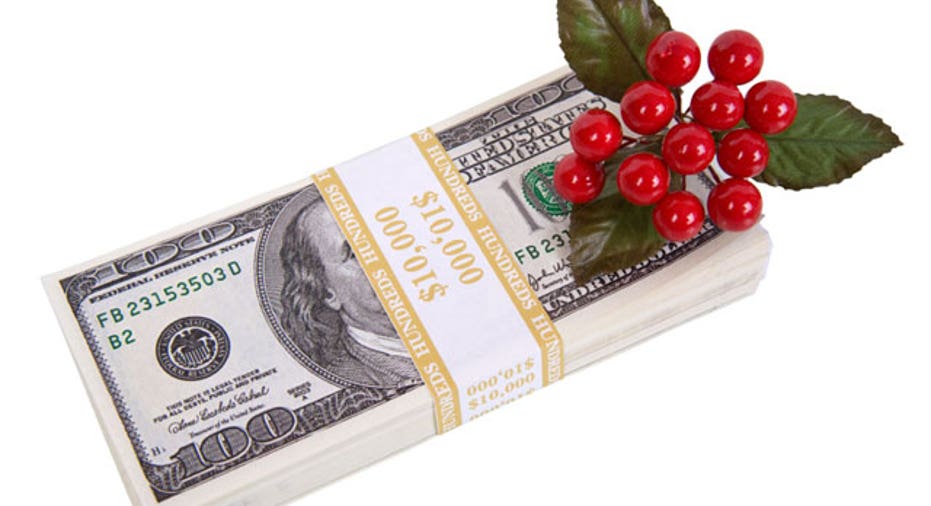Are Christmas Club Accounts Still a Good Idea?

Your mother probably had a Christmas club account at a local bank or credit union. You might remember her faithfully depositing $5 or $10 a week all year long to save up money for the holidays.
But is this simple method of saving for the holidays -- which reached their height of popularity in the 1970s -- still relevant today?
A Christmas club account -- which is not really a "club" at all -- is simply a special short-term savings account set up by a financial institution to encourage nest-egg building for the holidays. Most can be opened with a nominal deposit.
But there are few financial perks to be gained from Christmas clubs: The return on these accounts is negligible, and you usually cannot take the money out until the start of the holiday season, usually around Nov. 1.
The point, of course, is not to make a killing on compound interest, but to safeguard your money -- from yourself -- so you have enough funds to spend for gifts or even travel during the holidays. And it helps prevent a pile of credit card debt in January.
Christmas Clubs Still Alive at Credit Unions
While some banks still offer Christmas club accounts, credit unions, by far, are still the champions of this type of savings vehicle. According to the Credit Union National Association, or CUNA, nearly 72% of credit unions run Christmas clubs, and consumer interest in these clubs is holding steady.
"These kinds of accounts, small as they may be, are important because they encourage saving; this small step could lead to better saving habits," says Patrick Keefe, spokesman for CUNA.
At TruStone Financial Federal Credit Union in Plymouth, Minn., there's been a slight uptick in its "Holiday Helper" account this year, says Katie Grindeland, marketing manager for the credit union.
"Now, I must confess, this number is up by less than 1% (over last year) but an increase nonetheless," she says. Balances are slightly down over last year.
Grindeland notes that while the original intent of Christmas clubs was to target savers, the appeal of other financial products such as money market accounts, rewards programs for credit and debit cards, and certificates of deposit have taken the shine off Christmas club accounts. But that may be changing because of the belt-tightening that has taken hold among American consumers: "The allure to budget and save is back," she says. "A revival and/or a customization of (the Christmas club account) may be what is needed."
But these tiny pockets of Christmas club revivals at credit unions don't make a strong trend. Bruce McClary, financial educator and spokesman for ClearPoint Credit Counseling Solutions, a nonprofit nationwide financial education organization, says banking has evolved to the point where people can set up several accounts at the same bank, each for a specific purpose. "Being able to customize savings and checking in that manner has obscured the traditional Christmas club services," says McClary.
Still, the greatest benefit of a Christmas club account -- either a traditional one or one that you designate yourself -- is to avoid relying on credit cards to buy holiday gifts.
"Unfortunately, it's hard to make a strong case for using (traditional Christmas club accounts) when the interest rates are meager at best," says McClary. "People can get a slightly better rate of return by exploring other short-term savings options."
Alternatives to Christmas Club Accounts
Other than a do-it-yourself savings account you designate exclusively for the holidays, there are other ways to sock away money that will get you a better return on your investment than a traditional Christmas club account would.
For example, you can throw in a lump sum (if you have it) into a money market or certificate of deposit; just make sure the account matures before you start your Christmas shopping. If you do use credit cards, cash in any "cash backs" or gift cards prior to the shopping season.
If you don't have any money to plow into a savings account, you can still buy gifts using another throwback to the 1970s: layaway. With layaway, customers pay for items through installments, and this old-fashioned idea is being heavily promoted this year among some retailers, such as Sears, Kmart and Toys R Us.
"Before the mass popularity of credit cards, cash-strapped shoppers relied on store layaway plans to set aside purchases at a store and make periodic payments toward the full price," says Randy Mitchelson, owner of the online Daily Dollar Newsletter.
But if you do opt for a layaway plan -- sometimes also called "Christmas clubs" by retailers -- be careful, says Mitchelson. "Take a minute to understand the Christmas club or layaway rules upfront ... they may vary from store to store," he says.
Whether you use Christmas clubs or your own special savings account, the point of these gift-giving savings techniques is to avoid the inevitable panic that sets in early December -- and the ensuing credit card debt that follows because you haven't saved enough money. The key is to set up these savings plans early enough to reap the benefits.
"It is difficult for many people to come home each night and put $5 in a jar or piggy bank to be accumulated for some stated purpose," says Harlan Platt, author, economist and professor of finance at Northeastern University. "The nice thing about these clubs is that it is a type of forced savings."



















